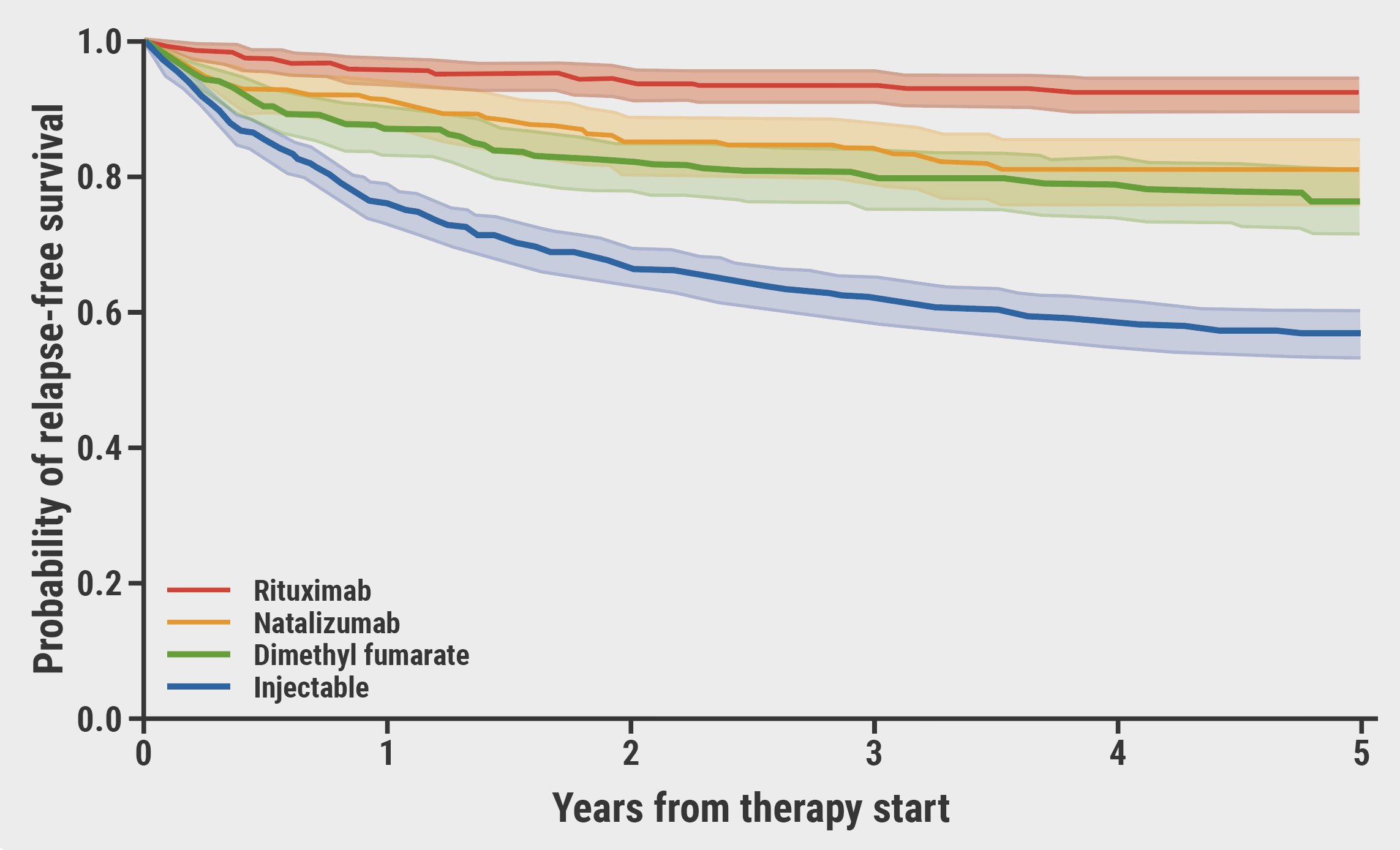The register-based, COMBAT-MS (NCT03193866) study evaluated the effectiveness of the most frequently prescribed initial MS therapies in Sweden. MS patients ever-treated with initial rituximab (n=472), natalizumab (n=269), dimethyl fumarate (n=339), or injectables (interferon-β, glatiramer acetate; n=858), were followed between 2010 and 2020. Outcome measures were first relapse (time to event), MRI lesion rate, EDSS score, and time to treatment discontinuation. Rituximab served as the reference therapy. Mr Peter Alping (Karolinska Institutet, Sweden) shared the results.
Initial treatment with injectables demonstrated the highest probability of relapse (HR 6.0), followed by dimethyl fumarate (HR 2.9) and natalizumab (HR 1.8; see Figure). However, baseline characteristics showed that natalizumab users were on average younger and had experienced more relapses prior to the study onset. Rate ratios of MRI lesions favoured initial rituximab therapy over injectables (rate ratio 4.5), dimethyl fumarate (4.8), and natalizumab (1.9). Interestingly, only injectables demonstrated significantly higher EDSS scores than rituximab. Time to treatment discontinuation was shortest for injectables, followed by dimethyl fumarate and natalizumab. Reasons to discontinue dimethyl fumarate or injectables were mainly adverse events or inadequate efficacy. Natalizumab was frequently discontinued due to John Cunningham virus positivity and concerns of progressive multifocal leukoencephalopathy.
Figure: Time to first relapse for initial MS treatments [1]
- Alping P, et al. Effectiveness of initial MS treatments in the COMBAT-MS trial: injectables, dimethyl fumarate, natalizumab and rituximab. OP34, ECTRIMS 2021 Virtual Congress, 13–15 October.
Copyright ©2021 Medicom Medical Publishers
Posted on
Previous Article
« Ublituximab meets primary endpoint for relapsing MS Next Article
ECTRIMS/EAN Clinical Guidelines on MS treatment: an update »
« Ublituximab meets primary endpoint for relapsing MS Next Article
ECTRIMS/EAN Clinical Guidelines on MS treatment: an update »
Table of Contents: ECTRIMS 2021
Featured articles
Preliminary data shows positive results of ATA188 for progressive MS
COVID-19
MS patients at risk of hampered immune response after vaccination
Immunotherapy in MS does not influence COVID-19 severity and mortality
Anti-CD20 antibodies associated with worse COVID-19 outcomes
ECTRIMS-EAN consensus on vaccination in MS patients
Experimental Treatments
The role of astrocyte phenotypes in acute MS lesions
Promising results of intrathecal MSC-NTF cells in progressive MS
Preliminary data shows positive results of ATA188 for progressive MS
Evobrutinib reduces relapses and MRI lesion activity
Primary endpoint of opicinumab for relapsing MS not met in AFFINITY trial
Elezanumab did not outperform placebo in progressive and relapsing MS
Ibudilast reduced retinal atrophy in primary progressive MS
Treatment Trials and Strategies
ECTRIMS/EAN Clinical Guidelines on MS treatment: an update
Rituximab most effective initial MS therapy in Swedish real-world study
Ublituximab meets primary endpoint for relapsing MS
Dynamic scoring system aids decision to switch MS therapies early
Long-term suppression of MRI disease activity with ocrelizumab
Stopping DMT: when or if at all?
Biomarkers
Early predictors of disability progression in paediatric-onset MS
High-sensitive biomarker detection in MS via novel ELISA assay
Cortical lesions predict cognitive impairment 20 years after MS diagnosis
Applicability of sNfL measurement in clinical practice
MRI more sensitive for disease activity than relapses in SPMS
Imaging
Changes in GABA-receptor binding among cognitively impaired MS patients
T2 lesions independently predict early conversion to SPMS
Natural killer-like CD8+ T cells as a reservoir of clonal cells related to MS activity
Neuromyelitis Optica Spectrum Disorder (NMOSD)
Eculizumab, satralizumab, or inebilizumab for NMOSD?
Long-term efficacy of satralizumab for NMOSD
Long-term efficacy data: inebilizumab for NMOSD
Progressive MS
Charcot Award 2021: Progressive MS, a personal perspective
Top score poster: Meta-analysis on the effect of DMTs
Cortical lesions predict disease progression and disability accumulation
Ocrelizumab shows long-term benefits in primary progressive MS
Other
WNT9B-gene variant associated with doubled relapse risk in MS
Melatonin associated with improved sleep quality in MS patients
“Expanded Disability Status Scale 0 is not normal”
Personality trait alterations in MS patients
Related Articles

December 4, 2023
Breakthrough in Predicting MS Progression Through Genetic Testing
November 25, 2020
Teriflunomide improves satisfaction versus prior DMT regardless of age
© 2024 Medicom Medical Publishers. All rights reserved. Terms and Conditions | Privacy Policy
HEAD OFFICE
Laarderhoogtweg 25
1101 EB Amsterdam
The Netherlands
T: +31 85 4012 560
E: publishers@medicom-publishers.com

